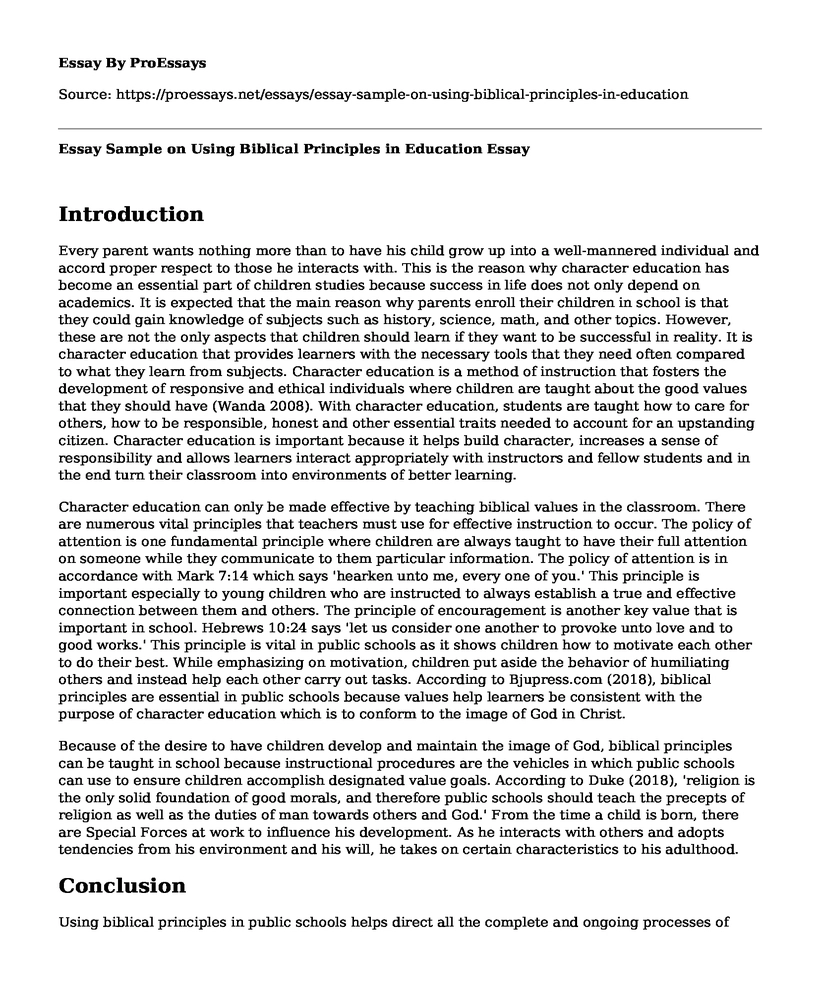Introduction
Every parent wants nothing more than to have his child grow up into a well-mannered individual and accord proper respect to those he interacts with. This is the reason why character education has become an essential part of children studies because success in life does not only depend on academics. It is expected that the main reason why parents enroll their children in school is that they could gain knowledge of subjects such as history, science, math, and other topics. However, these are not the only aspects that children should learn if they want to be successful in reality. It is character education that provides learners with the necessary tools that they need often compared to what they learn from subjects. Character education is a method of instruction that fosters the development of responsive and ethical individuals where children are taught about the good values that they should have (Wanda 2008). With character education, students are taught how to care for others, how to be responsible, honest and other essential traits needed to account for an upstanding citizen. Character education is important because it helps build character, increases a sense of responsibility and allows learners interact appropriately with instructors and fellow students and in the end turn their classroom into environments of better learning.
Character education can only be made effective by teaching biblical values in the classroom. There are numerous vital principles that teachers must use for effective instruction to occur. The policy of attention is one fundamental principle where children are always taught to have their full attention on someone while they communicate to them particular information. The policy of attention is in accordance with Mark 7:14 which says 'hearken unto me, every one of you.' This principle is important especially to young children who are instructed to always establish a true and effective connection between them and others. The principle of encouragement is another key value that is important in school. Hebrews 10:24 says 'let us consider one another to provoke unto love and to good works.' This principle is vital in public schools as it shows children how to motivate each other to do their best. While emphasizing on motivation, children put aside the behavior of humiliating others and instead help each other carry out tasks. According to Bjupress.com (2018), biblical principles are essential in public schools because values help learners be consistent with the purpose of character education which is to conform to the image of God in Christ.
Because of the desire to have children develop and maintain the image of God, biblical principles can be taught in school because instructional procedures are the vehicles in which public schools can use to ensure children accomplish designated value goals. According to Duke (2018), 'religion is the only solid foundation of good morals, and therefore public schools should teach the precepts of religion as well as the duties of man towards others and God.' From the time a child is born, there are Special Forces at work to influence his development. As he interacts with others and adopts tendencies from his environment and his will, he takes on certain characteristics to his adulthood.
Conclusion
Using biblical principles in public schools helps direct all the complete and ongoing processes of development towards a particular objective. The purpose of using biblical principles is to have the development process of children directed towards God's objective for man. This bends its efforts to the end of 2nd Timothy 3:17 that says 'the man of God may be perfect, thoroughly furnished unto all works good works.' This perfection can be reinforced in by teachers with the incorporation of biblical principles in education.
References
2nd Timothy 3: 17 King James Version
Bjupress.com. (2018). The Christian philosophy of Education Retrieved from https://www.bjupress.com/resources/christian-school/solutions/philosophy-education.php
Duke, S. (2018). Proposal: Teach the bible in public schools Retrieved from https://www.thenewamerican.com/culture/education/item/28657-proposal-teach-the-bible-in-public-schools
Hebrews 10:24 King James Version
Mark 7: 14 King James Version
Wanda R. (2008). A Framework for Understanding Character Education in Middle Schools. ProQuest. pp. 32
Cite this page
Essay Sample on Using Biblical Principles in Education. (2022, Nov 19). Retrieved from https://proessays.net/essays/essay-sample-on-using-biblical-principles-in-education
If you are the original author of this essay and no longer wish to have it published on the ProEssays website, please click below to request its removal:
- Children With Diabetes Have Poor Academic Performance Essay
- Clothed With Power: Christian Initiation Essay
- Terminology of Case: Linguistic Article Review
- Critical Essay on Pink Brain, Blue Brain: Boys & Girls in Schools
- Paper Example on Ethical Principles of Coventry University
- Paper Sample on 10+ Years Experienced Finance & Accounting Manager
- Applying for Technology Specialist Position - Qualified SCCM Admin - Free Application Letter Sample







